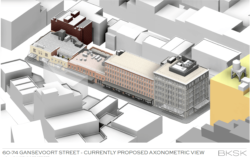
Gansevoort Market Development Rendering. Image credit: BKSK.
Preservationists renewed challenge to LPC permit for redevelopment of 5-building blockface in Gansevoort Market Historic District. In June of 2016, the Landmarks Preservation Commission voted to award Certificates of Appropriateness to developer 60-74 Gansevoort Street to redevelop five buildings in the Gansevoort Market Historic District. The work planned encompasses an entire blockfront composed of three tax lots between Greenwich and Washington Streets. The project entails the construction of new 82-foot-tall building replacing a former bus depot, a four story building replacing a former market structures, the construction of an addition to an existing building, the restoration of a historic Moderne market building, as well as the preservation of historic facades.
The proposal was designed by BKSK Architects for 60-74 Gansevoort Street, reported to be a partnership between Aurora Capital and William Gottlieb Real Estate.
Landmarks approved the proposal after modifications were made following a hearing in which the project was widely opposed by residents, elected officials, and preservationists. The developers lowered the height of one building from the initial proposal, and modified proposed facades to better integrate with the historic district. Commissioners Michael Goldblum and Michael Devonshire cast dissenting votes.
Historic preservationist organizations Save Gansevoort and the Historic Districts Council filed an article 78 petition challenging Landmarks’ issuance of the permits. The petitioners claimed the scope of the project was so extensive that it altered the character of the historic district, and amounted to rescission or redefinition of the historic district’s designation, without going through the necessary procedures to do so.
Manhattan Supreme Court Judge Joan B. Lobis dismissed the challenge, finding that the permit had been rationally issued, as is the standard of review for administrative decisions. The petitioners appealed.
The First Department upheld the lower court’s decision, determining that Landmarks had met the standard of rationality in issuing the permit. The court stated that in an extensive deliberative process, conducted over two lengthy public meetings, Landmarks duly considered the development’s impact on the district’s aesthetic and historic qualities, and the commission had compelled the developers to modify their plan to better relate to the district and the streetscape. The lower court had properly deferred to Landmarks’ expertise in determinations of an aesthetic or historic nature.
The court rejected the argument that issuance of the permit amounted to a de facto repeal of the historic district designation, pertaining to only a few buildings in a district composed of 104 structures.
Save Gansevoort LLC v. City of New York, 2018 N.Y. Slip Op. 01021 (1st Dep’t Feb. 13, 2018) (Attorneys: Michael S. Hiller, for Save Gansevoort; Zachary W. Carter, Elina Druker, for City; Karen Binder, for Developers).
By: Jesse Denno (Jesse is a full-time staff writer at the Center for NYC Law).

